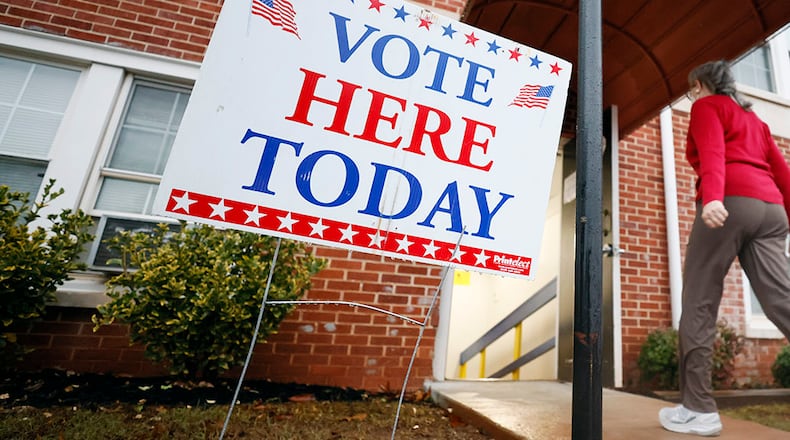A rapid runoff to fill the nation’s last U.S. Senate seat culminated with steady turnout and few difficulties across Georgia on Tuesday as voters decided the race between Democratic Sen. Raphael Warnock and Republican Herschel Walker.
Most voters didn’t encounter lines, with waits averaging about two minutes, a sharp contrast to the two-hour delays in some areas during early voting last week, state election officials said.
Instead of problems at the polls, most voters focused on exercising their right to choose their representation in one of the most politically competitive states in the nation.
Voters said they were glad the runoff would finally bring the election to an end, four weeks after Election Day in the general election. Unlike almost every other state, Georgia law required a runoff because neither candidate won a majority on Nov. 8.
“It’s a very big relief,” Brittany Brakeford, 27, said after voting at Fairington Elementary School in DeKalb County. “I’m so tired of getting text messages, calls and everything. I’m here, I made my voice heard and I’m just ready for it to be over.”
Credit: Lautaro Grinspan
Credit: Lautaro Grinspan
With such a tight race, voters knew their ballots would count, Betsy Prueter, 40, said outside her precinct at Israel Baptist Church in DeKalb.
“A lot is on the line,” said Prueter, a Warnock supporter. “A big issue for me is abortion rights. I was concerned that Walker was in favor of a nationwide ban on abortion. I also feel strongly about gun control measures, and I think I’m aligned with Warnock on that as well.”
Voters backing Walker said they were also concerned about abortion, as well as the economy and inflation.
“I feel if we’re going to actually be better, we need to improve our money,” Michael Tzager said outside Harbins Elementary School in Gwinnett County. “So, for me, it’s not about abortion or anything else. I think about fix the money, then you fix the world.”
Turnout was on pace to fall below the number of election day voters in last month’s general election, which is normal because runoffs usually draw fewer voters.
As of 2 p.m. Tuesday, an estimated 800,000 people had cast ballots in Georgia, said Gabriel Sterling, chief operating officer for the secretary of state’s office. The election day turnout added to nearly 1.9 million early and absentee voters.
“We are seeing no lines and pretty sizable turnout,” Sterling said during a press briefing. “Keep in mind that in the general election, we only had 1.4 million voters altogether on election day.”
There were isolated reports of lines and problems.
Two sites in Cherokee County and one in Fulton County had wait times over 30 minutes Tuesday afternoon, Sterling said. In most of the state’s other 2,400-plus polling places, voters quickly moved through lines.
A handful of locations experienced problems with voting equipment when polls opened. At Skyland Church in Brookhaven, officials said two voting touchscreens weren’t working, and at Parkside Elementary School in Atlanta, a ballot scanner wasn’t accepting ballots, requiring voters to drop their ballots into a secured bin to be scanned later.
The issue in DeKalb “had to do with human programming, nothing to do with the equipment itself,” Sterling said.
Fears that rain would dampen turnout didn’t appear to come to fruition. Predicted downpours never arrived, and the drizzle mostly cleared by the afternoon.
No matter their political views, voters said they knew the runoff was important and their votes mattered.
Credit: Cassidy Alexander
Credit: Cassidy Alexander
Yvette Wilson, 63, remembers hearing elders in her community talking about what people of color and women used to have to go through to vote. She now considers getting to the polls the least she can do.
“These young people, these millennials and Gen Z, I really hope they understand that voting really does affect the quality of our lives — not now, but further on down the road,” Wilson said.
Staff writers Cassidy Alexander, Alex Anteau, Taylor Croft, Tyler Estep and Lautaro Grinspan contributed to this article.
About the Author
Keep Reading
The Latest
Featured






